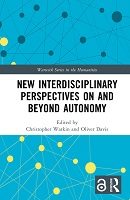Chapter 5 Autonomy and autoheteronomy in psychedelically assisted psychotherapy
Proposal review
| dc.contributor.author | Davis, Oliver | |
| dc.date.accessioned | 2022-12-05T13:37:35Z | |
| dc.date.available | 2022-12-05T13:37:35Z | |
| dc.date.issued | 2023 | |
| dc.identifier.uri | https://library.oapen.org/handle/20.500.12657/59826 | |
| dc.description.abstract | Psychedelically-enhanced psychotherapy (PAP) looks set to become a common remedy for a range of serious mental health problems. The market for providing PAP, including a secondary market for the training, credentialising and monitoring of therapists, is expanding rapidly. Concerns have been raised recently by actors in that secondary market about the potential for abuse in PAP, which have been framed in terms of a failure to respect patient autonomy. Such concerns cannot be adequately addressed without a fundamental reconsideration of the role of autonomy in psychotherapy. Discussing what autonomy means in psychotherapy and thence especially in PAP is the aim of this chapter, which starts from practitioner-focused guidance, before reflecting on the history of autonomy in geopolitics and ethics and finally returning to consider its place in psychotherapy generally and PAP specifically. The conclusion reached is that while protecting autonomy is the primary concern of medical ethics today, autonomy is not equal to the phenomenology of the psychedelic experience, which is better characterised in terms of ‘autoheteronomy’. The chapter’s contribution to the emerging ‘psychedelic humanities’ is to show that PAP brings to crisis longstanding cultural compromises and uncertainties around the way in which psychotherapy has been thought to foster patient autonomy. | en_US |
| dc.language | English | en_US |
| dc.subject.classification | thema EDItEUR::D Biography, Literature and Literary studies::D Biography, Literature and Literary studies::DS Literature: history and criticism | en_US |
| dc.subject.classification | thema EDItEUR::J Society and Social Sciences::JP Politics and government::JPF Political ideologies and movements | en_US |
| dc.subject.classification | thema EDItEUR::J Society and Social Sciences::JH Sociology and anthropology::JHM Anthropology::JHMC Social and cultural anthropology | en_US |
| dc.subject.classification | thema EDItEUR::J Society and Social Sciences::JB Society and culture: general::JBF Social and ethical issues::JBFA Social discrimination and social justice | en_US |
| dc.subject.other | Autonomy, philospohy, politics, language, Pharmacology, climate | en_US |
| dc.title | Chapter 5 Autonomy and autoheteronomy in psychedelically assisted psychotherapy | en_US |
| dc.type | chapter | |
| oapen.identifier.doi | 10.4324/9781003331780-8 | en_US |
| oapen.relation.isPublishedBy | 7b3c7b10-5b1e-40b3-860e-c6dd5197f0bb | en_US |
| oapen.relation.isPartOfBook | 8122fc20-b72b-438a-b044-6687c3571f06 | en_US |
| oapen.relation.isFundedBy | be79e974-26f6-48a0-9dc0-525280506d60 | en_US |
| oapen.relation.isbn | 9781032364070 | en_US |
| oapen.relation.isbn | 9781032364094 | en_US |
| oapen.imprint | Routledge | en_US |
| oapen.pages | 19 | en_US |
| peerreview.anonymity | Single-anonymised | |
| peerreview.id | bc80075c-96cc-4740-a9f3-a234bc2598f1 | |
| peerreview.open.review | No | |
| peerreview.publish.responsibility | Publisher | |
| peerreview.review.stage | Pre-publication | |
| peerreview.review.type | Proposal | |
| peerreview.reviewer.type | Internal editor | |
| peerreview.reviewer.type | External peer reviewer | |
| peerreview.title | Proposal review | |
| oapen.review.comments | Taylor & Francis open access titles are reviewed as a minimum at proposal stage by at least two external peer reviewers and an internal editor (additional reviews may be sought and additional content reviewed as required). |

